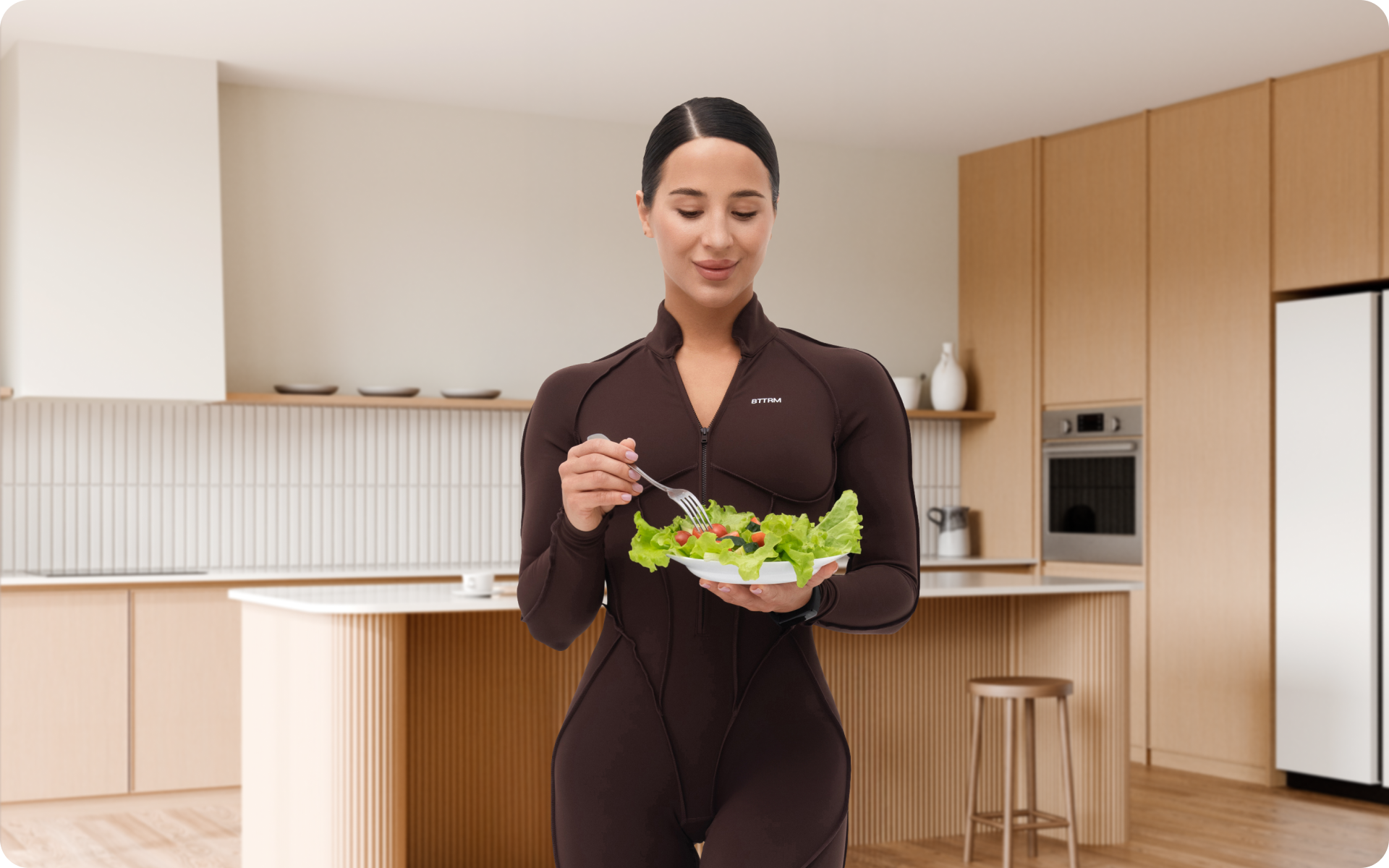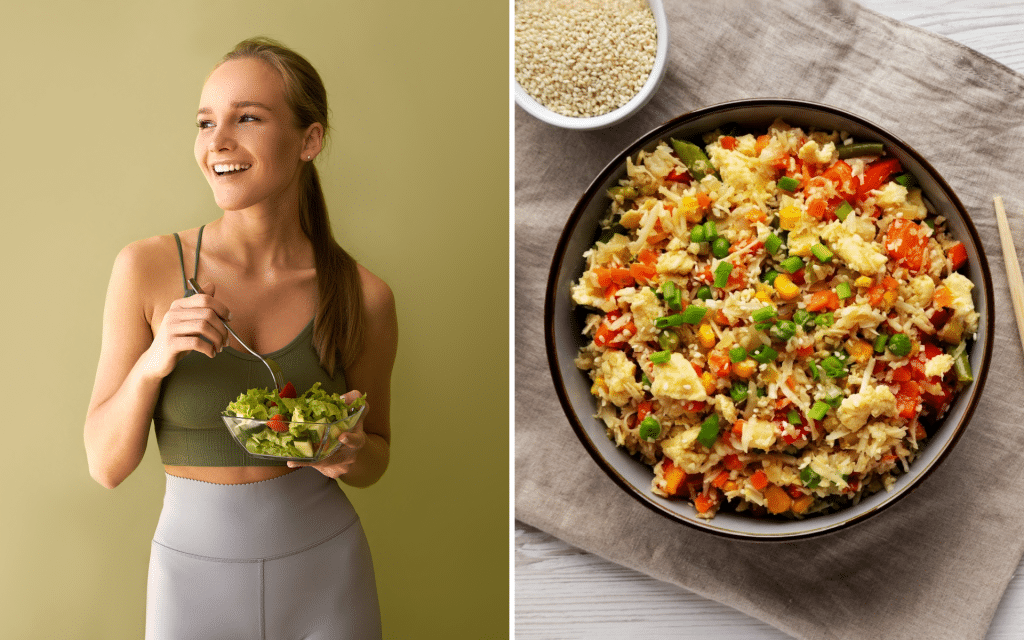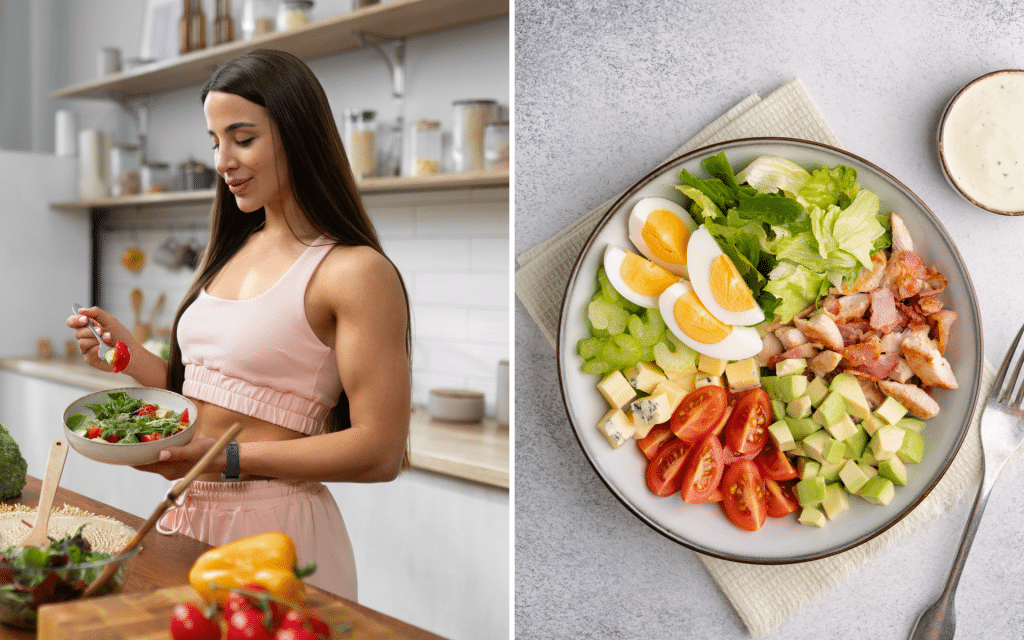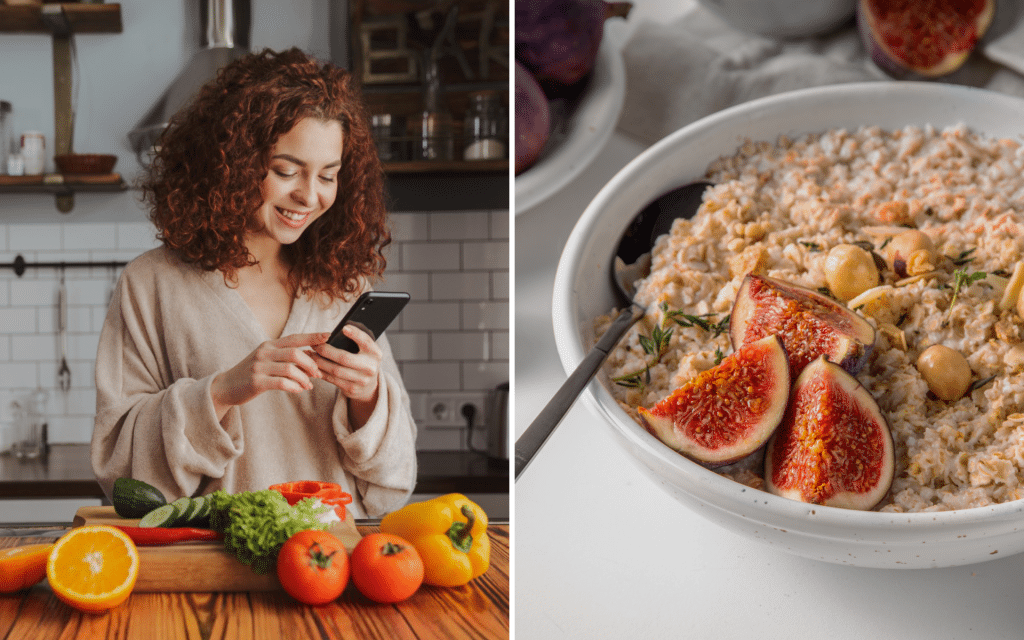Many experts say that sugar is a major driver of weight gain, cravings, and energy crashes, which is why many people are trying no-sugar diets.
A 1-week no-sugar diet is a great starting point for beginners, focusing on cutting added sugars while still including whole foods like fruits, vegetables, lean proteins, and whole grains (1).
Rest assured, this isn’t a no-carb diet. It’s mostly about avoiding ultra-processed, sugary foods and replacing them with nutrient-dense meals. For optimal results, regular exercise, proper hydration, and quality sleep are also essential aspects of this health journey.
In just one week, you might reduce cravings, feel more energized, and take the first step toward lasting health changes.
What Is A Realistic 1-Week No-Sugar Diet Plan For Beginners?
A realistic 1-week sugar-free meal plan for beginners should focus mainly on reducing added sugar intake. Yet, this doesn’t mean we have to drastically minimize all carbs the same way.
The 7-day no-sugar challenge doesn’t have to be extreme. It can include natural sugars found in fruits and dairy, but we should aim to eliminate ultra-processed foods that are low in nutritional value and high in added or refined sugar.
When thinking about added sugars, we mean:
- Soda
- Candy
- Baked goods
- Sweetened yogurts
- Sugary cereals
- Etc.
By avoiding foods with added sugar, most people will significantly reduce their daily sugar intake and may naturally lower their overall calorie consumption.
Rather than forbidding all carbs, this 1-week no-sugar diet encourages you to choose healthier, nutrient-dense options, including a sugar-free menu of:
- Whole grains: Oats, brown rice, quinoa, and whole-grain bread
- Fresh fruits: Berries, apples, and bananas
- Vegetables: Leafy greens and fibrous options, such as broccoli, Brussels sprouts, and carrots.
These foods can support energy levels and digestion while helping reduce sugar cravings over time.
Moreover, we must not neglect our protein and healthy fat intake, as they are crucial for maintaining adequate energy levels and preventing energy crashes. Eggs, lean meats, fish, legumes, nuts, and seeds are all essential foods to include in your daily diet.
Regarding beverages, water is the best way to stay hydrated.
However, we can also choose unsweetened sparkling water, herbal teas, and black coffee over sugary drinks or artificially sweetened alternatives.
Building balanced meals around whole foods, beginners can gradually and sustainably adjust to a no-sugar lifestyle without feeling deprived. The key is consistency, mindful eating, and making one small substitution at a time.
What Happens If You Stop Eating Sugar For 7 Days?
Removing added sugars from our diet can be a game changer, even if we only do it for a week. Because after noticing the benefits, a week may become two, and two may become three!
Following this diet for just one week can lead to noticeable changes in how we feel and our body’s functions.
- Improves Blood Sugar Management
Reducing intake of added sugars can lead to more stable blood sugar levels, resulting in more consistent energy throughout the day. By avoiding the sugar spikes and crashes usually associated with added sugar intake, you may improve insulin sensitivity and reduce the risk of developing type 2 diabetes over time (2, 3).
- Supports Weight Management
Added sugars are a significant contributor to increasing our calorie intake, and in most cases, these foods don’t provide meaningful nutrients or satiety.
When we cut back these foods, we’re most likely to reduce our overall calorie intake, which in turn can lead to gradual weight loss. It’s worth noting that significant results may typically require more than a week. However, sticking to this short-term change can help reduce hunger and cravings, setting the foundations for sustainable weight control (4).
If you wish to free yourself from all the extra pounds that have been weighing you down for way too long, start using the BetterMe: Health Coaching app and overhaul your entire life!
- Reduces Inflammation
Excessive intake of added sugar, particularly from ultra-processed foods, has been linked to chronic inflammation. This condition plays a key role in several diseases, such as heart disease, type 2 diabetes, and certain types of cancers. By reducing our intake of added sugar, we help reduce markers of inflammation in the body (5).
Yet, sugar intake is not the only contributing factor to inflammation.
Stress, lack of exercise, and poor sleep quality also play significant roles in the development of inflammation. Pairing a no-sugar diet with adequate stress management, good sleep, and regular exercise can add extra benefits (6).
- Boost Energy and Mood
By committing to one week without added sugar, you could notice some improvements in your energy levels and mood.
While sugary foods may give us a quick energy boost, it’s also true that we can experience sugar crashes, leading to:
- Fatigue
- Irritability
- Even anxiety
These blood sugar spikes and plunges might interfere with our brain’s ability to stay alert and emotionally balanced (7).
Moreover, blood sugar spikes can often contribute to mood swings, anxiety, and depression. By stabilizing blood sugar through a no-sugar diet, you may reduce these symptoms. Additionally, experts associate healthy diets lower in added sugar with better mental health outcomes (8).
Read more: The No-Sugar Diet: What You Need to Know to Get Started
Will I Lose Belly Fat If I Stop Eating Sugar?
Reducing your added sugar intake may lead to weight and belly fat loss, especially if it is part of an overall healthy lifestyle that includes regular exercise and balanced nutrition.
Added sugars, found in sodas, pastries, and ultra-processed snacks, are high in calories and low in nutrients. They are hyperpalatable and easy to overeat, but not very filling.
By cutting back on sugar intake, we are likely to naturally lower our daily calorie intake and avoid the calorie surplus that contributes to belly fat accumulation (9).
While dramatic fat loss in just one week may not be possible, eliminating added sugars from your diet for a week is a significant first step.
How Much Weight Will I Lose If I Don’t Eat Sugar For A Week?
You might experience reduced bloating, improved digestion, and a flatter stomach within a few days of following a no-sugar diet, even if fat loss is minimal.
Following a no-sugar diet for even just a week may result in some improvement in weight management. However, it’s worth noting that lasting fat loss—especially around the belly—takes longer and depends on other factors like:
- Sleep
- Metabolism
- Overall diet
- Physical activity
Consider this first week as a reset rather than a quick fix.
Eating less sugar can control cravings, improve your relationship with food, and build a foundation for sustained weight loss over time.
Read more: No Sugar Diet Food List To Keep Your Carb Intake Reined In
What Is A 1-Week No-Sugar Diet Plan?
When following a 1-week no-sugar diet plan, set realistic meal goal plans that adhere to a no-sugar diet food list. We should focus on eliminating added sugars and ultra-processed sugary foods, without jumping into restrictive low-carb territory.
Here’s a sample plan with meal ideas for 7 days, including 3 main meals and a snack option. This plan includes whole, nutrient-dense foods, natural carbs like fruits and whole grains, and no artificial sweeteners.
Day 1
Breakfast: Oatmeal with cinnamon, chia seeds, and sliced banana.
Lunch: Grilled chicken and farro salad with olive oil and lemon juice dressing.
Snack: Apple + natural peanut butter (no sugar added).
Dinner: Baked salmon, quinoa, and steamed broccoli.
Day 2
Breakfast: 2 boiled eggs + avocado toast on whole-grain bread.
Lunch: Lentil soup and roasted carrots.
Snack: Handful of mixed nuts (no sugar added).
Dinner: Stir-fried tofu with brown rice and mixed vegetables.
Day 3
Breakfast: Greek yogurt (plain, unsweetened) with berries, walnuts, and flaxseeds.
Lunch: Turkey and hummus wrap in a whole-grain tortilla, served with tomato and cucumber slices.
Snack: Fresh pear with a handful of almonds (no sugar added).
Dinner: Grilled chicken breast, sweet potato, and green beans.
Day 4
Breakfast: Chia pudding with low-fat milk, and topped with mixed berries.
Lunch: Quinoa salad with chickpeas, tomatoes, cucumber, celery, lettuce, and olive oil.
Snack: Hummus + baby carrots.
Dinner: Baked cod with brown rice and sautéed spinach.
When it comes to weight loss, progress is made by inches, not miles, so it’s much harder to track and a lot easier to give up. The BetterMe: Health Coaching app is your personal trainer, nutritionist, and support system all in one. Start using our app to stay on track and hold yourself accountable!
Day 5
Breakfast: Whole-grain toast with natural peanut butter + apple slices.
Lunch: Tuna salad with tomatoes, carrots, mixed greens, olive oil, lemon, and sunflower seeds, served with a side of whole-grain bread.
Snack: Cottage cheese (unsweetened) + blueberries.
Dinner: Beef and vegetable stir-fry with cauliflower rice.
Day 6
Breakfast: Smoothie with spinach, banana, plain yogurt, and ground flaxseed (avoid juice).
Lunch: Veggie omelet with whole-grain toast.
Snack: A small handful of walnuts and an orange.
Dinner: Roasted chicken, mashed pumpkin, and a green salad.
Day 7
Breakfast: Rolled oats with unsweetened coconut flakes and chopped nuts.
Lunch: Whole-grain pasta with a tomato-basil sauce (no added sugar) + a side salad.
Snack: Cucumber slices + guacamole.
Dinner: Grilled shrimp, wild rice, and asparagus.
How Do You Satisfy A Sweet Tooth On A No-Sugar Diet?
We can all crave something sweet from time to time. It is normal, especially in the first few days of a no-sugar diet.
Yet, we can still satisfy those cravings without reaching for added sugars.
Here are some no-sugar sweet tooth ideas to keep in mind:
- Enjoy naturally sweet fruits like berries, apples, bananas, or dates (in moderation). These are rich in fiber and essential nutrients that slow sugar absorption, reducing blood sugar spikes.
- Add cinnamon or vanilla for a sweeter aroma and flavor to foods like oatmeal, smoothies, or coffee without added sugar.
- Frozen banana slices or baked apples with cinnamon can be a comforting and naturally sweet treat.
- Unsweetened nut butters, such as almond or peanut butter, paired with fruits like apples or pears, can satisfy your cravings and provide a healthy source of fats.
- Herbal teas with naturally sweet flavors, such as rooibos, licorice root, or mint, can help curb cravings and soothe your palate.
Over time, your taste buds will adjust, and your cravings for extremely sweet foods will decrease.
However, it’s essential to be patient, as changes won’t occur overnight.
Keeping our focus on whole, nutrient-dense foods will help our sweet tooth become easier to manage naturally.
Fruit can be part of a no-sugar diet. This diet typically focuses on eliminating added sugars, not natural ones found in whole fruits. Foods without refined sugar include fruits such as apples, berries, and oranges, which are rich in fiber, vitamins, and antioxidants. Just beware of dried fruits and fruit juices, which often contain concentrated or added sugars. No, one banana a day is not too much sugar, if it’s part of a balanced diet. Bananas are rich in natural sugars, as well as potassium, fiber, and vitamin B6. The fiber present in bananas, like that in all fruits, helps slow down sugar absorption, making them a healthier choice, especially compared to ultra-processed, sugary foods. Honey is generally not allowed on a no-sugar diet. While it’s natural, honey is mostly sugar with similar effects on blood glucose as white refined sugar. If your goal is to eliminate all added sugars—even the natural ones used as sweeteners—you should avoid honey during your week of no-sugar diet. All grains, especially whole grains like brown rice or wild rice, can be part of your no-sugar diet. These foods provide complex carbohydrates, including fiber, as well as many essential vitamins and minerals. White rice is more processed and may spike blood sugar more quickly (especially when eaten on its own), but it’s still free of added sugars. And if you pair it with vegetables, protein, and healthy fat for balance, it can be part of a balanced diet.Frequently Asked Questions
Can I eat fruit on a no-sugar diet?
Is one banana a day too much sugar?
Can I eat honey on a no-sugar diet?
Can I eat rice on a no-sugar diet?
The Bottom Line
Eliminating added sugar for seven days won’t fix everything, but it is a powerful tool to reset our bodies and help build healthier eating habits. By focusing on whole, minimally processed foods, we can give our body the nutrients it needs without the metabolic strain of added sugars.
DISCLAIMER:
This article is intended for general informational purposes only and does not serve to address individual circumstances. It is not a substitute for professional advice or help and should not be relied on for making any kind of decision-making. Any action taken as a direct or indirect result of the information in this article is entirely at your own risk and is your sole responsibility.
BetterMe, its content staff, and its medical advisors accept no responsibility for inaccuracies, errors, misstatements, inconsistencies, or omissions and specifically disclaim any liability, loss or risk, personal, professional or otherwise, which may be incurred as a consequence, directly or indirectly, of the use and/or application of any content.
You should always seek the advice of your physician or other qualified health provider with any questions you may have regarding a medical condition or your specific situation. Never disregard professional medical advice or delay seeking it because of BetterMe content. If you suspect or think you may have a medical emergency, call your doctor.
SOURCES:
- A High-Sugar Diet Consumption, Metabolism and Health Impacts with a Focus on the Development of Substance Use Disorder: A Narrative Review (2022, pmc.ncbi.nlm.nih.gov)
- Carbohydrates and Blood Sugar (n.d, hsph.harvard.edu)
- Reduction in Added Sugar Intake and Improvement in Insulin Secretion in Overweight Latina Adolescents (2007, pmc.ncbi.nlm.nih.gov)
- Long-term effects of a very-low-carbohydrate weight loss diet compared with an isocaloric low-fat diet after 12 months (2009, ajcn.nutrition.org)
- Excessive intake of sugar: An accomplice of inflammation (2022, pmc.ncbi.nlm.nih.gov)
- Chronic Inflammation in the Context of Everyday Life: Dietary Changes as Mitigating Factors (2020, pmc.ncbi.nlm.nih.gov)
- Brain-derived neurotrophic factor and its clinical implications (2015, pmc.ncbi.nlm.nih.gov)
- Sugar intake from sweet food and beverages, common mental disorder and depression: prospective findings from the Whitehall II study (2017, pmc.ncbi.nlm.nih.gov)
- DIETARY MANAGEMENT OF OBESITY: CORNERSTONES OF HEALTHY EATING PATTERNS (2019, pmc.ncbi.nlm.nih.gov)












